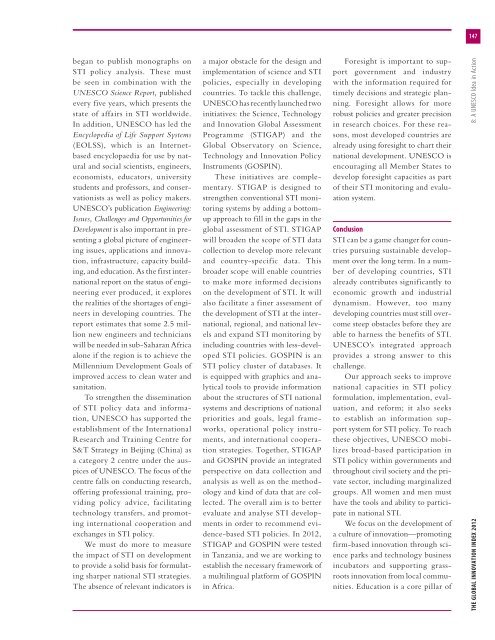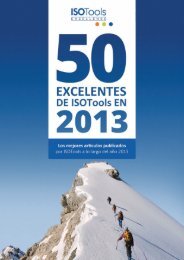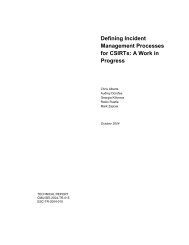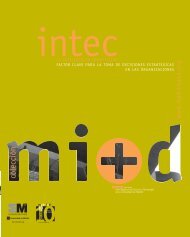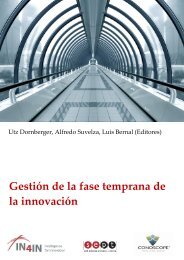The Global Innovation Index 2012
The Global Innovation Index 2012
The Global Innovation Index 2012
You also want an ePaper? Increase the reach of your titles
YUMPU automatically turns print PDFs into web optimized ePapers that Google loves.
egan to publish monographs on<br />
STI policy analysis. <strong>The</strong>se must<br />
be seen in combination with the<br />
UNESCO Science Report, published<br />
every five years, which presents the<br />
state of affairs in STI worldwide.<br />
In addition, UNESCO has led the<br />
Encyclopedia of Life Support Systems<br />
(EOLSS), which is an Internetbased<br />
encyclopaedia for use by natural<br />
and social scientists, engineers,<br />
economists, educators, university<br />
students and professors, and conservationists<br />
as well as policy makers.<br />
UNESCO’s publication Engineering:<br />
Issues, Challenges and Opportunities for<br />
Development is also important in presenting<br />
a global picture of engineering<br />
issues, applications and innovation,<br />
infrastructure, capacity building,<br />
and education. As the first international<br />
report on the status of engineering<br />
ever produced, it explores<br />
the realities of the shortages of engineers<br />
in developing countries. <strong>The</strong><br />
report estimates that some 2.5 million<br />
new engineers and technicians<br />
will be needed in sub-Saharan Africa<br />
alone if the region is to achieve the<br />
Millennium Development Goals of<br />
improved access to clean water and<br />
sanitation.<br />
To strengthen the dissemination<br />
of STI policy data and information,<br />
UNESCO has supported the<br />
establishment of the International<br />
Research and Training Centre for<br />
S&T Strategy in Beijing (China) as<br />
a category 2 centre under the auspices<br />
of UNESCO. <strong>The</strong> focus of the<br />
centre falls on conducting research,<br />
offering professional training, providing<br />
policy advice, facilitating<br />
technology transfers, and promoting<br />
international cooperation and<br />
exchanges in STI policy.<br />
We must do more to measure<br />
the impact of STI on development<br />
to provide a solid basis for formulating<br />
sharper national STI strategies.<br />
<strong>The</strong> absence of relevant indicators is<br />
a major obstacle for the design and<br />
implementation of science and STI<br />
policies, especially in developing<br />
countries. To tackle this challenge,<br />
UNESCO has recently launched two<br />
initiatives: the Science, Technology<br />
and <strong>Innovation</strong> <strong>Global</strong> Assessment<br />
Programme (STIGAP) and the<br />
<strong>Global</strong> Observatory on Science,<br />
Technology and <strong>Innovation</strong> Policy<br />
Instruments (GOSPIN).<br />
<strong>The</strong>se initiatives are complementary.<br />
STIGAP is designed to<br />
strengthen conventional STI monitoring<br />
systems by adding a bottomup<br />
approach to fill in the gaps in the<br />
global assessment of STI. STIGAP<br />
will broaden the scope of STI data<br />
collection to develop more relevant<br />
and country-specific data. This<br />
broader scope will enable countries<br />
to make more informed decisions<br />
on the development of STI. It will<br />
also facilitate a finer assessment of<br />
the development of STI at the international,<br />
regional, and national levels<br />
and expand STI monitoring by<br />
including countries with less-developed<br />
STI policies. GOSPIN is an<br />
STI policy cluster of databases. It<br />
is equipped with graphics and analytical<br />
tools to provide information<br />
about the structures of STI national<br />
systems and descriptions of national<br />
priorities and goals, legal frameworks,<br />
operational policy instruments,<br />
and international cooperation<br />
strategies. Together, STIGAP<br />
and GOSPIN provide an integrated<br />
perspective on data collection and<br />
analysis as well as on the methodology<br />
and kind of data that are collected.<br />
<strong>The</strong> overall aim is to better<br />
evaluate and analyse STI developments<br />
in order to recommend evidence-based<br />
STI policies. In <strong>2012</strong>,<br />
STIGAP and GOSPIN were tested<br />
in Tanzania, and we are working to<br />
establish the necessary framework of<br />
a multilingual platform of GOSPIN<br />
in Africa.<br />
Foresight is important to support<br />
government and industry<br />
with the information required for<br />
timely decisions and strategic planning.<br />
Foresight allows for more<br />
robust policies and greater precision<br />
in research choices. For these reasons,<br />
most developed countries are<br />
already using foresight to chart their<br />
national development. UNESCO is<br />
encouraging all Member States to<br />
develop foresight capacities as part<br />
of their STI monitoring and evaluation<br />
system.<br />
Conclusion<br />
STI can be a game changer for countries<br />
pursuing sustainable development<br />
over the long term. In a number<br />
of developing countries, STI<br />
already contributes significantly to<br />
economic growth and industrial<br />
dynamism. However, too many<br />
developing countries must still overcome<br />
steep obstacles before they are<br />
able to harness the benefits of STI.<br />
UNESCO’s integrated approach<br />
provides a strong answer to this<br />
challenge.<br />
Our approach seeks to improve<br />
national capacities in STI policy<br />
formulation, implementation, evaluation,<br />
and reform; it also seeks<br />
to establish an information support<br />
system for STI policy. To reach<br />
these objectives, UNESCO mobilizes<br />
broad-based participation in<br />
STI policy within governments and<br />
throughout civil society and the private<br />
sector, including marginalized<br />
groups. All women and men must<br />
have the tools and ability to participate<br />
in national STI.<br />
We focus on the development of<br />
a culture of innovation—promoting<br />
firm-based innovation through science<br />
parks and technology business<br />
incubators and supporting grassroots<br />
innovation from local communities.<br />
Education is a core pillar of<br />
147<br />
THE GLOBAL INNOVATION INDEX <strong>2012</strong> 8: A UNESCO Idea in Action


